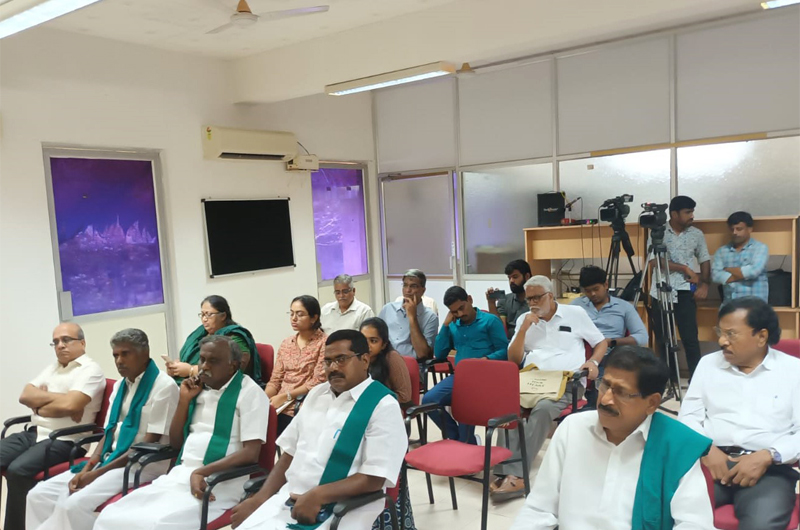Former judge of the Punjab and Haryana Court K. Kannan said that courts are not really the answer to every dispute. Participating in a discussion at the Press Institute of India (PII) on the recently launched book, Cauvery – A Long-winded Dispute, authored by T. Ramakrishnan, senior associate editor, The Hindu, he said that no judge can take “a view which is permanent”. The 2018 judgment of the Supreme Court, which is “perhaps not the last order (on the dispute)”, has created a “favourable climate”. But what matters is “power to people, power to stakeholders”, he pointed out, emphasising the importance of mediation and dialogue among the stakeholders.
Justice (retired) Kannan decried the tendency to approach the court without exhausting the option of discussion while he referred to the Mullaperiyar dispute and the proposed check dam project of Kerala on the Silandhi River. Appreciating Ramakrishnan’s effort, he said the author has traced the genesis of the dispute to a protest by farmers of the Madras Presidency in 1806. Photographs portraying the involvement of a large number of workers during the construction of dams, the bonhomie between Tamil Nadu and Karnataka Chief Ministers M.G. Ramachandran and Ramakrishna Hedge, and the mood of anger during a bandh had been carefully chosen. The Cauvery is not just about water, people are emotionally connected to it, he said. Recalling what former Chief Minister J. Jayalalithaa had said about the river dispute (Tamil Nadu is not the drainage canal for Karnataka), Justice Kannan explained the lower riparian state’s right over the river water as the land under cultivation had always been larger in Tamil Nadu.

river water as the land under cultivation had always been larger in Tamil Nadu.
Ramakrishnan began with an anecdote and said that if journalists in the South India do not write about or highlight issues, personalities and problems in a credible manner, even well-informed people in the other regions of the country may remain ignorant of ground realities – what happens in the north usually gets detailed coverage. This factor, coupled with prompting from N. Ram (director, The Hindu Group) drove him to write the monograph on the Cauvery, he said. “What people in Tamil Nadu should keep in mind is that right or wrong, several sections of society in Karnataka have been nursing a sense of grievance that the British-era agreements did injustice to them, a position with which I do not agree and which I have explained in detail in my book. But that grievance is real. We, people from the eastern side of the Cauvery River, should not gloss over it… I did not take any categorical stand, favouring Tamil Nadu or Karnataka on the issue of rights over the Cauvery River water. My response is: the river is a common resource. Not just for the two major riparian states but also for two other states of Kerala and Puducherry. People should move away from the thought that their territory owns an inter-state river. Equitable utilisation or distribution of such river water will only lessen the burden of distress, the principle which forms the basis for constitution of the Cauvery Water Disputes Tribunal.”

of the Cauvery Water Disputes Tribunal, Ramakrishnan said.
The book, published by The Hindu Group, has a summary of the work of all the tribunals established under the 1956 law on inter-state rivers. “When the Supreme Court gave its judgement in February 2018 on the Cauvery dispute, veteran farmer-leader S. Ranganathan, the principal petitioner in the court in the early 1980s, said finality had come to the issue. Though I viewed his statement sceptically then, I now agree with him. This is because neither of the states have been raising age-old issues. No longer does one state talk of “historical injustice” or the other refer to the permanence of any treaty. Nor does anyone rake up water apportionment. All these issues, according to me, have become things of the past,” explained Ramakrishnan, adding, “The only matter that remains unresolved is Karnataka’s proposal to build a dam at Mekedatu. I am quite sure that if the political leadership of the two states display the will and the spirit of accommodation, even this issue can be thrashed out. Dialogue among stakeholders at all levels will lead to better understanding of each other’s position.”

P.R. Pandian, president, Coordination Committee of All Farmers’ Associations, V. Sathyanarayanan, general secretary, Consortium of Cauvery Delta Farmers, and K.V. Elankeeran, president, Cauvery Delta Farmers Associations, said their main concern is that the issue should not be politicised and that they are always willing for discussions with their Karnataka counterparts.
Earlier, Sashi Nair, director, PII, welcomed the gathering.
Note: Justice K. Kannan is the founder-director of Madhyastham, a one-stop conflict resolution portal. He is a member of SC-appointed committee to recommend artificial intelligence in court systems and also a committee member for drafting model mediation law. He has done certificate courses at the Program on Negotiation at Harvard Law School and at the Center for Negotiation and Dispute Resolution, University of California Hastings College of Law in 2017. He was awarded a Weinstein JAMS International Fellowship for mediation in 2017. He was a part of the Supreme Court appointed committee for drafting the law on mediation and the draft presented to the Court was the basis for the Mediation Act, 2023 that was notified on 15th Sep 2023.
Ramakrishnan has been covering the Cauvery water dispute subject for more than 30 years. About ten years ago, N. Ram advised him to write a revised version of what former IAS officer S. Guhan had produced in 1993 – The Cauvery River Dispute: Towards Conciliation, a book published by Frontline.
(This article includes inputs from The Hindu report.)



 from Webdoux
from Webdoux